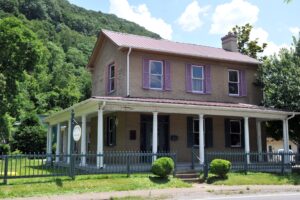A summer archeological field school will offer students at West Virginia State University (WVSU) the opportunity to uncover more of the history surrounding the Hale House and the early salt industry at Malden.
History 399: Historical Archaeology will focus on the grounds of the Hale House, former home of one of the Kanawha Valley’s early business and political leaders, Dr. John Hale. The house was built in 1838. After consolidating various properties between Malden and Charleston by 1860, Hale was the owner of possibly the largest salt works in North America, supplying the thriving meat-packing center of Cincinnati.
In this course, students will learn the basic concepts and procedures of historical archaeology by carrying out a real dig. This is the second year for the field school to be held at the Hale House. Last year, hundreds of artifacts were unearthed, including a prehistoric drill and knife made of Kanawha Black Flint dating to the Archaic Period.
“This summer we will be conducting a phase II investigation with a deeper and more intense look at the same area,” says Dr. Michael Workman, adjunct professor at WVSU and project director. “At the same time, we will be conducting research at libraries and the West Virginia Archives to learn what we can from traditional sources. Matching what we find in the ground with what’s in the books is one of the challenges of historical archaeology. We will be looking for evidence of structures on the property and for any artifacts that offer a glimpse into the daily life of people in this area.”
The four-week field school will begin June 17, 2024, with an orientation on the WVSU campus. Most of the instruction will be offered on-site at the Hale House in Malden. Students are required to be present from 9 a.m. until noon but may work through the afternoon. The public is invited to visit the field school site during class hours and participate in the dig, which will conclude July 12.
“We have room for four or more students who may register for the course through WVSU. We also have scholarships to cover part of the cost of tuition,” Workman says.
The archeological field school project is being presented with financial assistance from the West Virginia Humanities Council, a state affiliate of the National Endowment for the Humanities, the Kanawha Salines Foundation and The Greater Kanawha Valley Foundation.
For more information, contact Dr. Michael Workman at 304-288-1757 or
mworkman2@wvstateu.edu.









